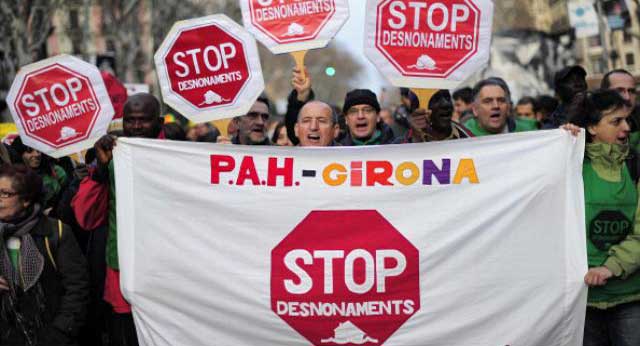Since the housing bubble popped in Spain, unleashing one of the deepest recessions in memory, the nation’s public debt has more than doubled, to nearly 100% of GDP. Because of the way the law regarding mortgage defaults operates the collapse in the property market has had a devastating effect on many hundreds of thousands of households.
In Spain debt stays with you until death, it is never forgiven nor forgotten, and mortgages are “full recourse.” That means that even when a bank has repossessed someone’s home, that person could still be left on the hook for thousands, if not hundreds of thousands, of euros of debt. Most Spanish foreclosure victims end up personally liable for not only much of the outstanding loan, but also thousands of euros in penalty interest charges and tens of thousands of euros in court fees. They can end up owing more than the original mortgage, but with no house and nowhere to live. It is estimated that there have been 600,000 evictions since the financial crisis started in 2008.
The mass foreclosures and evictions in Spain sparked a nationwide resistance movement. When a local resident is threatened with eviction, word quickly spreads and groups of neighbours and social activists begin forming and offering their support. By the time police officers arrive there is an almost impenetrable wall of protesters between them and the front door of the property to be foreclosed. The roots of Podemos lie in this popular form of mass resistance.
The Rajoy government’s response to this popular movement was to pass the Citizen Security Law also known as the ‘Gag Law’ which limits freedom of speech and curbs the right to peacefully protest with the introduction of fines ranging between €100 ($111) and €600,000. Of course the Citizen Security Law is actually intended to increase the insecurity of the poorest citizens.
Part of the Gag Law was specifically aimed at the anti-eviction movement and it includes a clause that makes it illegal for people to try to prevent, through passive, non-violent resistance, the forced eviction of a local resident. If found guilty, suspects could face crippling fines of up to €30,000.
Now, the European Commission, for once seemingly on the side of the poor and not the banks, has launched a formal legal procedure against Spain for failing to protect consumers against the abusive clauses that proliferate in Spanish mortgage contracts. It also demands that Spanish law finally gets in line with European directives on mortgage contracts and payment orders, which date back to the year 1993.
During the immediate aftermath of the multi-billion-euro bailout of Spanish banks, in 2012, the Commission published a number of scathing reports on Spain’s dysfunctional foreclosure laws. The problem, as the same reports pointed out, was that changing the laws would risk doing untold damage to the already deeply compromised balance sheets of the banks. The Commission decided to defer action on Spain’s unjust mortage laws in order to protect the fragile Spanish banking system.
Now, four years and over 600,000 evictions later, the balance sheets of Spain’s banks are apparently fortified enough to withstand an overhaul of Spain’s foreclosure laws. At least that’s what the Commission seems to believe. Judging by the disappointing quarterly results announced this week by most of Spain’s biggest banks, the country’s banking system is still very weak.
On Thursday, Spain’s second biggest bank and one-time systemically important financial institution, BBVA, announced first-quarter profits of €709 million, down 54% from the same period last year. In response to the news, its shares nose-dived over 6.5% on Thursday and 4.7% on Friday. The bank blamed its poor performance on a heady cocktail of factors, including currency market volatility, in particular in key emerging markets like Mexico, Brazil and Turkey, increased operating costs, lower revenues from its brokerage activities, and a permanently stagnant property market in Spain.
Now, to cap it off, the European Commission is calling for a complete overhaul of Spain’s foreclosure laws, which would almost certainly make it more difficult for the banks to speedily foreclose on delinquent owners, in turn hampering their ability to securitise and offload property assets on to international funds, such as Goldman Sachs and BlackRock. These express foreclosures have been an essential source of liquidity in recent years.
If the European Commission remains unimpressed with Spain’s caretaker government’s minimal efforts to address abusive practices in the sector, it could refer the case to the European Court of Justice. If the court then rules in favour of Spain’s mortgage victims, the government could end up facing punitive fines.
The Rajoy government seems to be digging in its heels on the issue and on Friday it announced that it will seek to block crucial aspects of the Catalan regional government’s broadly popular anti-eviction law, which is aimed at reducing evictions in the north-eastern region, as well as expanding the stock of properties available for social housing. The news website Voz Populi (Google translation) revealed that the government was bowing to direct pressure from large Spanish banks and some of the world’s biggest investment funds. They include BBVA, which has spent months trying to sell a €1.5 billion mortgage portfolio.
The U.S. rating agency Moody’s warned in February that the Catalan anti-eviction law included a clause that states that if a bank sells a mortgage to a third party, such as, say, an investment firm on the other side of the planet, just as BBVA hopes to do, the debtor can be released from the credit arrangement. It’s primarily for this reason that the new law poses, in Moody’s words, a “very serious threat,” not only to real estate investment in Catalonia, “but to Spain’s entire mortgage market.”

